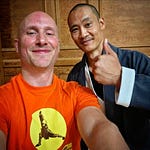Click above to listen to the NEW episode! I just got back from a great weekend moderating a panel on AI and Ethics (hosted by the SF Hip-Hop Festival and Good Trouble Ventures), and then hosted a Hip-Hop Chess Blitz Tournament the day after. It was crazy fun and cool. Please follow us @real64blocks on IG to participate in our next event. I wanna shout out Ted Castro of Nor Cal House of Chess for letting us borrow some boards and clocks. You can see some of the stuff that went down on our IG. Shout out to Rakaa from Dilated Peoples for being a co-founder of the organization and helping to make it all happen.
Self-discipline stands as the cornerstone of masculine virtue, and the ancient Stoics understood that without mastery over one's internal impulses, a man remains forever enslaved to his circumstances. The Stoics recognized that the battleground for true freedom isn't external but internal—fought against the tyrannical forces of unchecked anger, mental distraction, lustful desires, and gluttony. Marcus Aurelius, writing in his private journal while commanding armies, captured this perfectly: "You have power over your mind - not outside events. Realize this, and you will find strength." This wasn't theoretical philosophy but practical wisdom forged in the crucible of leadership and warfare. When a man allows anger to dictate his responses, he surrenders his rational mind to emotional chaos. When he indulges every sexual impulse or stuffs himself beyond necessity, he proves himself weak where he should be strongest. The Stoics taught that these failures of self-control don't just harm the body—they corrupt the soul and diminish one's capacity for virtue.
The Stoic approach to discipline was refreshingly practical: they didn't advocate for the suppression of natural desires but for their rational governance. Epictetus, himself a former slave who understood powerlessness intimately, taught that "No man is free who is not master of himself." This mastery required daily practice—examining one's thoughts each evening, setting intentions each morning, and choosing virtue in the moment of temptation. They understood that anger clouds judgment and makes wise decisions impossible, that mental distraction prevents focus on what truly matters, that unchecked lust reduces a man to his basest impulses, and that overindulgence in food weakens both body and will. The Stoics developed specific exercises: pause before reacting in anger, practice voluntary discomfort to build resilience, set clear boundaries around sexual behavior, and eat only what serves health rather than pleasure. They knew that discipline isn't about denying oneself all pleasure, but about ensuring that reason—not impulse—guides one's choices. In this way, they transformed self-discipline from a burden into the very foundation of masculine strength and character.
NOW: Go click the audio above to learn how to refine your discipline.
Holla at a scholar,
Adisa Banjoko, the AntiGuru













Share this post